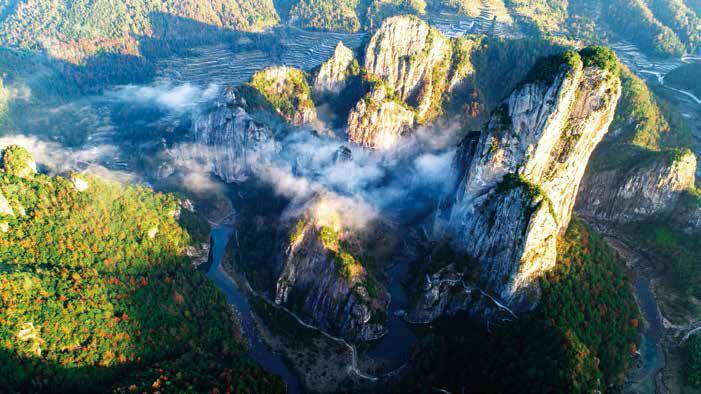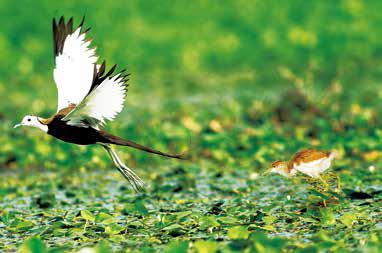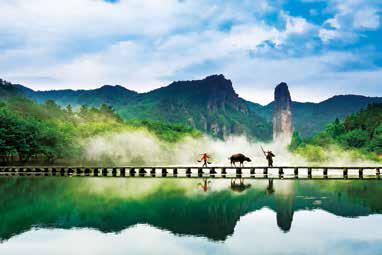Poetic Beauty of Zhejiang
2019-03-18YeQianZongHe
Ye Qian Zong He
Since very ancient times, Zhejiang has been portrayed abundantly in poems. In fact, the natural beauty of Zhejiang gave birth to nature poems about 1,600 years ago and transformed Chinese poetry forever. In , a gigantic anthology compiled under an imperial decree from 1705 to 1706, more than 1,000 poems by 300 relatively well known poets, refer to eastern Zhejiang. The anthology contains 48,900 poems by 2,200 poets of the Tang Dynasty.
About 1,600 years ago, Xie Lingyun came to serve as the governor of Yongjia, which, now only a small county of Wenzhou, covered the present-day Wenzhou in southeastern Zhejiang. During his one-year term, he fell for the picturesque beauty of the rivers and mountains of Yongjia and wrote poems singing of the natural charms, thus producing a new kind of poetry never seen before in China. He is unanimously considered the founding father of nature poetry that integrates nature and human aspirations and sentiments. Fortunately, Nanxi River, part of Yongjia, still retains its natural beauty. Take a trip on the river and one can well imagine and wonder what the river looked like so many centuries ago.

楠溪江石桅岩景区。A birds-eye view of a section of Nanxi River
Guoqing Temple, a Buddhist sanctuary in Tiantai Mountain, was built in 598, the 18th year of Emperor Wen of the Sui Dynasty. Every inch of the temple and the mountain tells a story, let alone numerous poems and essays that discuss the correlation of nature, life, faith presented by the temple in the mountain. Some people prefer to visit the temple in early springtime when the fuzzy greens provide a harmonious touch to the oranges of the temple wall.
Xiazhu Lake in Deqing in northern Zhejiang appears in many ancient poems. One of them was written by Mao Pang of the Song Dynasty (960-1279). The lake is actually the centerpiece of a 36-square-kilometer labyrinth crisscrossed by over 1,000 streams and creeks and dotted with 600 islets , which add up to the largest wetland in Jiangnan. Today, the wetland is home to a colony of crested ibis, an extremely rare bird on Chinas national protection list. The species reestablished itself in Xiazhu in 2007 through a restoration program. The lake is also home to thousands of herons from March to September.

下渚湖濕地公园成为水鸟天堂。Xiazhu Lake Wetland Park is a paradise of birds.

缙云县仙都风景区。A view of Xiandu Scenic Zone in Jinyun County

西湖春色風光。A view of the Bai Causeway on the West Lake in springtime
Li Bai, the greatest poet of the Tang Dynasty (618-907), visited Zhejiang many times and some of his best poems were about what he saw and even dreamed of in this land of natural beauty. One poem he wrote is about Siming Mountain in Ningbo, a harbor city in eastern Zhejiang. At 600 to 900 meters above sea level, the mountain boasts the most beautiful mountain highway in the province. In spring, Siming Mountain is a paradise of flowers.
Jinyun in the south of Zhejiang boasts some of the best mountains and rivers in the province. Some peaks appear in some blockbuster films and television dramas. Dinghu Peak, a gigantic stone pillar standing alone by the lake, looks amazing and makes one wonder how nature nurtured such a singular monolith.
Hangzhou shines so much in ancient poems for its prosperity, life, human stories, legends, peace, wealth, religion and historical figures that it has long been known as a paradise city on the earth. Bai Juyi, one of the greatest poets of the Tang Dynasty, and Su Dongpo, definitely the greatest poet of the Song Dynasty, served as Hangzhou mayor respectively. What they left behind them are more than the Bai Causeway and the Su Causeway in the lake. They wrote poems about the city.
